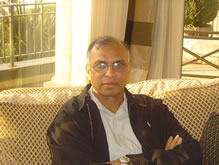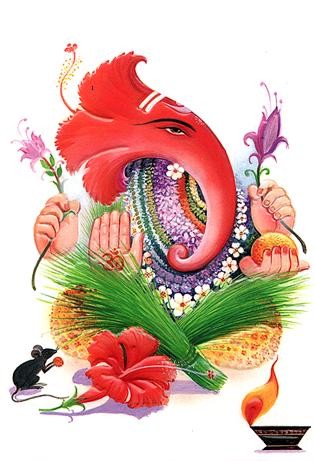రేమల రావు (Rao Remala) : Microsoft's First Indian Hire
By:
Rao Remala, the first Indian hire at Microsoft, is a man used to hard work and in the last two years world travel.
 Born in a tiny coastal village in Andhra Pradesh, where he tread six miles to school everyday, he now lives in the trendy Yarrow Point suburb of Seattle in a palatial house, artfully decorated with sandalwood idols of Hindu gods. Remala's claim to fame comes from writing the original code for Microsoft Windows. Over a two decades long career at Microsoft, Remala worked on Windows 1.0, Windows 2.0, MS Cobol, OLE (Object Linking and Embedding), MS Office 95 and MS Office 97, culminating with director for R&D and Outsourcing.
Born in a tiny coastal village in Andhra Pradesh, where he tread six miles to school everyday, he now lives in the trendy Yarrow Point suburb of Seattle in a palatial house, artfully decorated with sandalwood idols of Hindu gods. Remala's claim to fame comes from writing the original code for Microsoft Windows. Over a two decades long career at Microsoft, Remala worked on Windows 1.0, Windows 2.0, MS Cobol, OLE (Object Linking and Embedding), MS Office 95 and MS Office 97, culminating with director for R&D and Outsourcing.When Remala joined Microsoft in 1981 it was a fry cry from today's Microsoft, which lures the best and brightest seeking work at the most reputed company in the world with compensation and benefit packages among the most generous in the industry. The Microsoft Remala came to was a little known company with a handful of employees, functioning out of a tiny office in downtown Bellevue. He had been recruited by the company from Hindustan Computers Ltd, which developed India's first microcomputer in 1978.
Recalls Remala: "The first day itself, someone walks into my office and explains to me the project I will be working on. He must have introduced himself, but I didn't recall his name and I had to ask him, who are you and he said, ‘I am Bill.'"
Remala reported directly to Bill Gates for three years and, like any start-up, he recalls Microsoft as a very informal place with frequent face to face encounters with Gates. "He was like anyone else, you would walk up to him, talk to him, challenge him. It was a very different world those days." Remala says, "As a person, he really liked technical people, who are competent and who work hard and are trying and I happened to be one of them." Gates did not display even the faintest streak of arrogance, says Remala, adding that he was "very nice, cordial, in his interactions and communications."
At the time, several Indians in the area worked at Boeing. Reminisces Remala: "Interesting thing is that people would ask me, who do you work for at Indian social gatherings and I would tell them Microsoft. They would ask me, couldn't you get jobs at some of the hot companies, what kind of benefits do you have?"
Indeed, acknowledges Remala, at the time he himself only expected to work for a couple of years at Microsoft before moving on to the hot computer company of the era, IBM. "To be honest, we never thought we were on to something big. We did not have this great vision that they would be building a great company 20 years from now." The company was so small, recalls Remala, that there was little planning in software development. "Wednesday morning we would start changing the code. It wasn't like you developed a thick manual and then have a development team start working."
But the passion of the work kept Remala with Microsoft ultimately for 23 years.
When he was offered stock options by Gates in 1982, recalls Remala, "I was actually upset, because they weren't paying me enough." Gates was reviewing employees at the time and told Remala that the company was so pleased with his performance that it was raising his salary by 10 percent and giving him stock options. "I complained to him that I didn't want the options, just a higher salary," he says, miffed that as a foreign recruit with an annual salary of $22,000 he was not paid at par with other employees.
In the early years, stock options were computed from the salary. "How they came up with the number was that if you were making $25,000 salary, you got 2,500 shares; if you made $30,000 shares, you got 3,000. The formula was, in fact Bill said it, that in 4 to 5 years the company would go public and the shares would be worth $10 each, which would be equivalent to one year's salary."
Lucky for Remala, he didn't pass up the stock options that were ultimately worth millions.
The path to those millions was tough. The work hours were grueling and on some days Remala never went home. He only had a half day off when his youngest daughter was born in Seattle. Now, he says jokingly, Microsoft employees get three months family leave. "One of the managers commented once that you Indians are very lucky that your wives don't complain."
The Indian presence at Microsoft, Remala says, did not begin to be really felt till the late 1980s. Before 1987 fewer than 10 Indians worked at the company and at that time it was common for them to know everyone and even meet regularly.
Remala retired from Microsoft in 2004. "I had difficulty making the decision to leave. That was tough because all your life all you did was basically you went to school, then college and a job to work, work, work. You have these nightmares that once I leave what will happen? But I never felt that after I left."
He says the changes at the company as it grew, with its layers of management did not leave him quite as enthusiastic and passionate about his work as he had been in his earlier years. "We were used to a certain style of working at Microsoft and when things changed it would sometimes be frustrating," he says.
Unlike many of his contemporaries who established their own start-ups, Remala was never tempted. "For these entrepreneurs you really need passion, that's what makes it happen. You need to put in a lot of time. I put in long hours ay HCL, then Microsoft. The first few years are going to be really challenging. I had to ask myself, do I really want to go through that again?"
Now retired, he travels the world and funds a few charitable projects, including a foundation, named after himself, which is building an eye hospital in his village in Andhra Pradesh. He has dabbled as an investor in a few start-ups, but his first priority, he says, is enjoying life and "taking care of myself."
That takes him back to his roots and childhood habit of walking six miles to school; he and his wife Kumari can be frequently spotted on long hikes. But the neighborhood is different, dramatically different.
Courtesy: Little India



11 Comments:
Inspiring information about RaoRemala. I feel proud as an Indian. Remala Venkateswara Rao (Rao Remala) , He is from my native place.
I heard about rao remala but never saw him in INDIA. He is va very great person.. And very prooud to tell that i was also from his native place and relative of him.
BTW, What is his Native place? Knowing that he is the first Microsoft employee from Inidan origin is a great feeling..
Native place: T. kottapalem
I feel very proud to know bout his foundation work for Microsoft's flagship product of Windows. It is well known that it is the Windows, the early years' main product of MS, that took the company to the very heights it scalled later on. Software development in those days (1970s and 80s ) was a very tedious job when every thing had to be done manually, unlike today. Now we have host of tools and IDEs for every dam activity of the software development making the job ofthe developers a smooth walk. Of course inspite of having all these the present generation is feeling SW development to be very difficult, that is a differeent (and strange) thing. So we can understand the horrific work of yesteryears developers. Definitely it is a great achievement for Rao to build such a monumental product in that times.
Dr. G V Rao
I feel very proud to know about his foundation work for Microsoft's flagship product of Windows. It is well known that it is the Windows, the early years' main product of MS, that took the company to the very heights it scalled later on. Software development in those days (1970s and 80s ) was a very tedious job when every thing had to be done manually, unlike today. Now we have host of tools and IDEs for every dam activity of the software development making the job ofthe developers a smooth walk. Of course inspite of having all these the present generation is feeling SW development to be very difficult, that is a differeent (and strange) thing. So we can understand the horrific work of yesteryears developers. Definitely it is a great achievement for Rao to build such a monumental product in that times.
Dr. G V Rao
ray ban outlet
gucci handbags
hollister kids
louis vuitton outlet online
michael kors outlet
michael kors handbags
oakley sunglasses
polo ralph lauren
coach outlet online
michael kors handbags
true religion outlet
ugg outlet
coach outlet online
louis vuitton outlet stores
celine handbags
ugg clearance
ugg boots
louis vuitton outlet
jordan retro
coach outlet store online
coach outlet store online
uggs outlet
louis vuitton handbags
lebron 12
north face jacket
louis vuitton outlet
tiffany and co
prada uk
jordan concords
oakley sunglasses wholesale
air jordan retro
hollister kids
jordans
ugg outlet
prada outlet
michael kors
abercrombie
north face outlet
20151223yuanyuan
zhengjx20160525
gucci outlet
coach outlet store
air jordan 4
michael kors canada outlet
michael kors outlet
coach outlet online
celine handbags
kate spade outlet
burberry sale
adidas originals
michael kors outlet online
true religion outlet online
adidas stan smith
oakley sunglasses
michael kors outlet
air jordan shoes
adidas yeezy
ray bans
louis vuitton outlet online
tory burch shoes
coach outlet online
ralph lauren outlet
michael kors outlet
nike air max uk
air jordan femme
cheap air jordans
fitflop shoes
kate spade
tiffany and co
coach outlet
nike free 5.0
oakley sunglasses wholesale
adidas superstar shoes
louboutin shoes
michael kors handbags
true religion outlet store
michael kors outlet
christian louboutin outlet
louis vuitton outlet
oakley outlet
supurman of andra
jeje0608cardinals jersey
polo ralph lauren
ugg boots
polo pas cher
lacoste sale
canada goose
oakley sunglasses wholesale
jaguars jersey
tory burch shoes
michael kors outlet
coach outlet
bottega veneta
asics sneakers
michael kors
vibram fivefingers
nike shoes
bape t shirt
palm angels clothing
fear of god essentials hoodie
yeezy 700
yeezy 350 v2
off white outlet
bape
kobe byrant shoes
adidas yeezy
off white hoodie
Post a Comment
<< Home